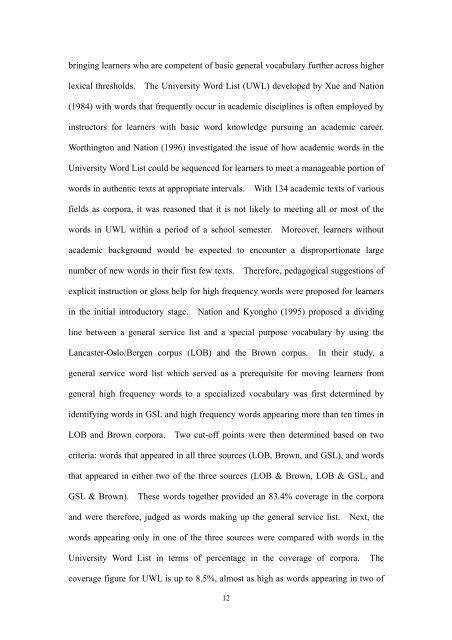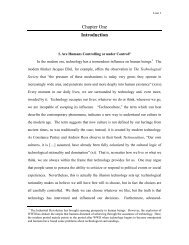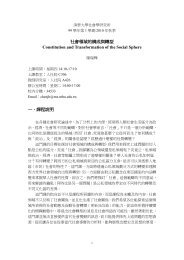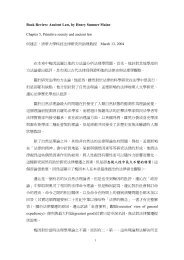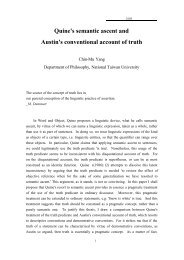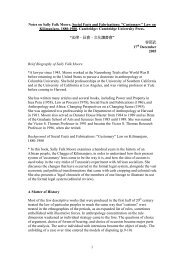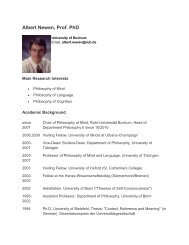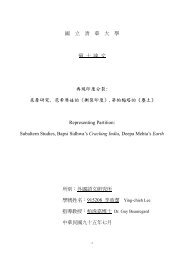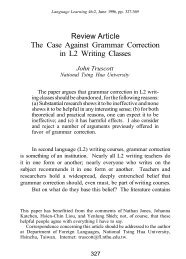Effects of Graded Texts on EFL College Students' Incidental ...
Effects of Graded Texts on EFL College Students' Incidental ...
Effects of Graded Texts on EFL College Students' Incidental ...
You also want an ePaper? Increase the reach of your titles
YUMPU automatically turns print PDFs into web optimized ePapers that Google loves.
inging learners who are competent <str<strong>on</strong>g>of</str<strong>on</strong>g> basic general vocabulary further across higher<br />
lexical thresholds. The University Word List (UWL) developed by Xue and Nati<strong>on</strong><br />
(1984) with words that frequently occur in academic disciplines is <str<strong>on</strong>g>of</str<strong>on</strong>g>ten employed by<br />
instructors for learners with basic word knowledge pursuing an academic career.<br />
Worthingt<strong>on</strong> and Nati<strong>on</strong> (1996) investigated the issue <str<strong>on</strong>g>of</str<strong>on</strong>g> how academic words in the<br />
University Word List could be sequenced for learners to meet a manageable porti<strong>on</strong> <str<strong>on</strong>g>of</str<strong>on</strong>g><br />
words in authentic texts at appropriate intervals. With 134 academic texts <str<strong>on</strong>g>of</str<strong>on</strong>g> various<br />
fields as corpora, it was reas<strong>on</strong>ed that it is not likely to meeting all or most <str<strong>on</strong>g>of</str<strong>on</strong>g> the<br />
words in UWL within a period <str<strong>on</strong>g>of</str<strong>on</strong>g> a school semester. Moreover, learners without<br />
academic background would be expected to encounter a disproporti<strong>on</strong>ate large<br />
number <str<strong>on</strong>g>of</str<strong>on</strong>g> new words in their first few texts. Therefore, pedagogical suggesti<strong>on</strong>s <str<strong>on</strong>g>of</str<strong>on</strong>g><br />
explicit instructi<strong>on</strong> or gloss help for high frequency words were proposed for learners<br />
in the initial introductory stage. Nati<strong>on</strong> and Ky<strong>on</strong>gho (1995) proposed a dividing<br />
line between a general service list and a special purpose vocabulary by using the<br />
Lancaster-Oslo/Bergen corpus (LOB) and the Brown corpus. In their study, a<br />
general service word list which served as a prerequisite for moving learners from<br />
general high frequency words to a specialized vocabulary was first determined by<br />
identifying words in GSL and high frequency words appearing more than ten times in<br />
LOB and Brown corpora. Two cut-<str<strong>on</strong>g>of</str<strong>on</strong>g>f points were then determined based <strong>on</strong> two<br />
criteria: words that appeared in all three sources (LOB, Brown, and GSL), and words<br />
that appeared in either two <str<strong>on</strong>g>of</str<strong>on</strong>g> the three sources (LOB & Brown, LOB & GSL, and<br />
GSL & Brown). These words together provided an 83.4% coverage in the corpora<br />
and were therefore, judged as words making up the general service list. Next, the<br />
words appearing <strong>on</strong>ly in <strong>on</strong>e <str<strong>on</strong>g>of</str<strong>on</strong>g> the three sources were compared with words in the<br />
University Word List in terms <str<strong>on</strong>g>of</str<strong>on</strong>g> percentage in the coverage <str<strong>on</strong>g>of</str<strong>on</strong>g> corpora. The<br />
coverage figure for UWL is up to 8.5%, almost as high as words appearing in two <str<strong>on</strong>g>of</str<strong>on</strong>g><br />
12


